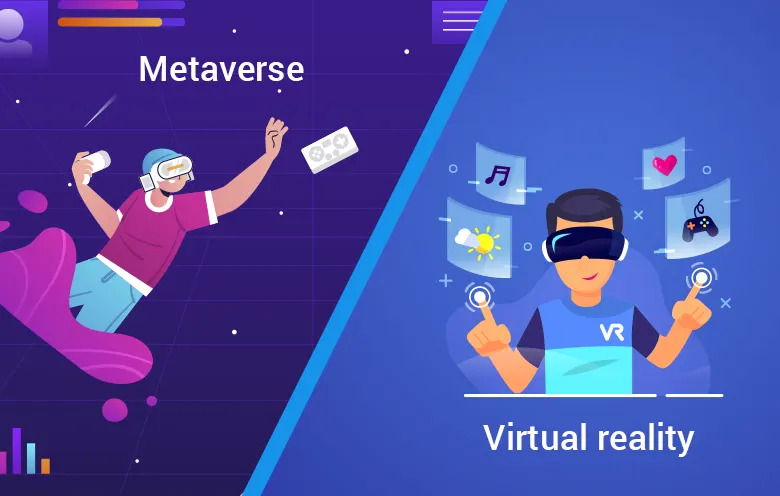At present, as the new age metaverse technology has taken the center stage, people are confusing it with virtual reality (VR). Of course, metaverse is a platform that enables people to live, trade, explore and interact digitally in the virtual world. However, there are remarkable discrepancies between the metaverse and VR.
On the surface, both the metaverse and VR deliver state-of-the-art immersive experiences, but these two are certainly not the same thing. Modern enterprises must know in detail about metaverse and virtual reality to identify significant differences between them.
In this post, we have shed some light on how they are different from each other. However, before diving into the inconsistencies, let us first see what metaverse and VR technologies are. Then we will look at a detailed comparison of metaverse v/s virtual reality.
Why is there so much hype around immersive technologies
First appearing in the science fiction book in 1992, the metaverse has become one of the hottest topics of the twenty-first century. Henceforward, we are seeing science fiction become science reality. The phrase “metaverse” started gaining momentum after Mark Zuckerberg’s annunciation of rebranding Facebook to Meta.
On the other hand, the concept of virtual reality has been around since 1961 i.e., since the inception of data-driven digital computing. De facto, technology buffs have pushed the concept of virtual reality even before the acquaintance with true VR capability and operability. Today, VR has existed for over a decade, although it has just gained all eyeballs and is only becoming more prevalent.
Diving deep into the metaverse
According to broader definitions, the metaverse represents a futuristic 3D virtual world. It is actually a virtual realm i.e. a network of interconnected virtual realities that can be managed independently. Thus, the metaverse is not a single virtual world but a multitude of digital universes that lets users interact with digital content in the form of digital avatars.

Source: Meta/Facebook
Today, most organizations have started building their own metaverse iteration with differing approaches as it offers limitless possibilities. To enter the metaverse, you will require to wear immersive devices, like VR headgear, smart glasses and augmented reality (AR) devices. Alternatively, you can also use the rectangles of this era viz. smartphones or tablets, to get into the metaverse.
In the space age, this second layer of our current reality will bring most companies onboard to develop digital assets and sell them in virtual life. Metaverse is like a dystopian dream for some segments of society. However, achieving realism in the metaverse is challenging as it requires high-grade graphics like the ones you see in the movie Ready Player One.
A flick through the virtual reality technology
Virtual reality, generally recognized as VR, is a fully immersive three-dimensional computerized environment that delivers a user the feeling of being in a holographic space. It lets you truly change the perception of reality, hence the terminology ‘virtual reality.’ In relation to the metaverse, VR is merely one of the mediums that will let you connect with the multiverse world.

Virtual Reality Simulation
With VR-powered head-mounted displays or headgear, you can access the virtual world. Currently, the applications of VR in the medical and education industries have assumed greater importance. However, with so many common features, it is easy to confuse VR with metaverse technology. Undoubtedly, VR is the prime component of the metaverse, but it is only one part of the implicit concept. Read more about how the metaverse is impacting these 7 industries
Key differences between the metaverse and VR
| Aspect | Metaverse | Virtual Reality |
|---|---|---|
| Technology | Mixed reality concept | Computer interface technology |
| Coined in | 1992 | 1961 |
| Ownership | User | Brand |
| Scalability | Highly scalable | Moderately scalable |
| Publicized | 2000 | 1968 |
| Tech committee | Meta, HTC, Google, Apple, Microsoft, Oculus, Valve |
Valve, HTC, Oculus |
Head-to-head differences between the metaverse and virtual reality
1. Platform interpretation
The metaverse delivers a cross-platform experience as it enables you to interact with people globally in the virtual world from the comfort of their homes. While with virtual reality technology, you can access numerous platforms such as Oculus, SteamVR, Quest, etc. In this way, we can say that the metaverse is a platform that comprises VR as one of its features.
2. Technological constraints
There are a few technological limitations for VR as it can only go so far about virtual reality simulations. Moreover, to experience a virtual space, you wear a VR-enabled hardware device like a headset or smart goggles. On the other end, the metaverse comes with no such restrictions. In the metaverse, you can relish virtual life through digital avatars accessed through different technologies like AR, VR, or MR.
3. Possession of 3D entities
One of the key disparities between the metaverse and VR is the ownership of 3D objects. With the VR system, you will have zero proprietorships on the technology. However, when you use a VR system, you only possess the gadget. On the other hand, the metaverse enables you to own virtual objects, including digital assets, items, or goods. So, in the metaverse, you have a complete proprietorship of virtual entities.
4. User convenience of virtual spaces
When it comes to user experiences, the metaverse and VR vary significantly. In the case of virtual reality, you can use a VR headset or glasses to experience the virtual space. Additionally, VR allows only a certain number of digital avatars, like in online games. On the contrary, the metaverse is an open environment like the real world where everyone can move around anywhere in the virtual world.
5. The tenacity of shared virtual worlds
Today, the biggest question in curious minds is: what is the longevity of virtual reality and metaverse? VR seems to be winning the long-lived race in the present time, as the metaverse is still in the nascent stage. However, from the technical standpoint, in the meta world, your digital avatar persists in the shared universe even after leaving the metaverse. While in the case of VR, your virtual reality experiences come to an end when you turn off the VR device.
The future of immersive realities
There is a clear distinction in comparison between VR and metaverse. However, virtual reality is merely a subset. VR is a cornerstone of the metaverse platform. Moreover, the metaverse is a massive, ever-evolving virtual environment. If you want to keep abreast with the time and embrace metaverse or VR, get in touch with our experts. To know more about metaverse and VR, read our blog post on the future of reality.



